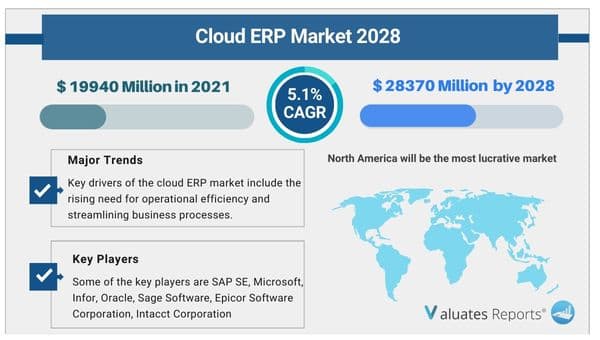
Cloud ERP is a type of enterprise resource planning (ERP) software that is hosted on a cloud computing platform, rather than on premises within an enterprise's own data center.
The global Cloud ERP market size is projected to reach USD 28370 Million by 2028, from USD 19940 Million in 2021, at a CAGR of 5.1% during 2022-2028. Key drivers of the cloud ERP market include the rising need for operational efficiency and streamlining business processes. The advent of big data analytics will drive the growth of the cloud ERP market during the forecast period.

The several advantages offered by the ERP software to businesses will fuel the growth of the market in the coming years.
Need for operational efficiency
Several business departments like finance, sales, marketing, procurement, and supply chain require a centralized solution for maintaining the competitive edge. Optimizing the processes and keeping track of expenses are needed by enterprises for enhanced flexibility and scalability. This will positively impact the growth of the cloud ERP market in the coming years. The cloud-based software delivers accurate financial information and performance in a timely manner. This leads to better data-driven decisions and superior inventory controls. Cloud ERP also offers lower upfront costs, tremendous computing power, and real-time modification without hiring IT specialists or causing unnecessary disruptions to the business. Companies become agile and adaptable and all the work related to bugs, and IT infrastructure upgrades is delegated to third-party SaaS vendors. This leads to common regulatory standards and seamless integration of modern technologies. The simplified software and hardware secure the overall operating performance.
Big data analytics
A huge volume of data is getting generated every single day through enterprise computer servers, IoT devices, and other media platforms. The ERP systems collect all these data comprising HR, finance, CRM, and other functional departments. Big data analytics leverages the datasets by enhancing the performing capacity of ERP solutions. This will bolster the expansion of the cloud ERP market in the forthcoming years. Businesses are able to gain metrics-driven insights for making informed decisions. ERP systems fail to configure real-time inventory and supply chain data as they essentially lack the requisite business intelligence to predict future product demands. Herein big data tools are integrated with the software to forecast the market trends and exactly map out where the company needs to move in the future. Big data analytics not only gives the current demand and supply equation but also goes beyond visualizing all the historical data patterns in a single dashboard to predict future consumer demands. Additionally, organizations around the world are increasingly relying on analytics tools for improving asset reliability and maintaining high standards of production quality. It provides real-time logistics management and enhanced visibility over all the operations of the business. For instance, Hadoop is a free processing tool that rolls out faster information and delivers timely decisions.
Benefits of cloud ERP systems
The deployment of cloud ERP software is significantly less than on-premise systems and the recurring expenses are much less. It is highly suitable for small-scale organizations that do not have big budgets. The initial license costs and hardware maintenance is cheaper leading to longer-term ROI. The third-party provider maintains the database, servers, and network infrastructure. Hence large and small-sized firms are gradually shifting their IT assets to cloud support systems which will drive the demand of the cloud ERP market in the upcoming years. The subscription-based model provides 24/7 support with greater uptime and security without the need for additional IT staff. Moreover, companies are able to take advantage of emerging technologies such as big data, IoT, AI, and ML algorithms as the software are readily integrated with all the features without costly installations or technical expertise. Auto upgradation provides scalability and adaptability. The data stored in the cloud is secure with multi-factor authentication, end-to-end encryption, and security measures built into every piece of the system. The servers are centrally located with no danger related to physical theft. The ERP software can be customized to maintain the workload fluctuations in a less expensive process as there is no need for additional expenses. The automatic upgradation leads to simplified compliance with several international provisions.
Integration issues with legacy and on-premise systems
Cloud ERP solutions entail system complexities as the existing redundant software has to be integrated with the newer versions which is a time-consuming process. Organizations lack the proper resources which will hamper the growth prospects of the cloud ERP market in the forthcoming years. The legacy applications are not compatible and require more effort. This creates a high error rate and a long turnaround time. As the data can be accessed from anywhere it is prone to hackers. Also, the software does not have fixed ownership which means unnecessary and irrelevant upgrades may creep in.
Based on type, the finance segment will grow the highest in the cloud ERP market share as organizations are deploying cloud solutions for handling complicated financial data. The system provides a comprehensive and scalable solution for managing customer invoices, payments, and revenue, and tracking other order receipts.
Based on application, the large enterprises' segment will witness significant growth due to affordability and economies of scale allowing them to spend on advanced digital solutions like cloud ERP software.
Based on region, North America will be the most lucrative market due to the presence of key industry players and early adopters of advanced technologies.
|
Report Metric |
Details |
|
Report Name |
Cloud ERP Market |
|
Market size value in 2021 |
USD 19940 Million |
|
Revenue forecast in 2028 |
USD 28370 Million |
|
Growth Rate |
5.1% |
|
Base year considered |
2021 |
|
Forecast Period |
2022-2028 |
|
By Type |
Finance, Marketing, Sales, Human Resource, Operations |
|
By Application |
SMEs, Large Enterprises |
|
Report Coverage |
Revenue & volume forecast, company share, competitive landscape, growth factors, and trends |
|
Segments Covered |
By Type, Application, and Region |
|
Geographic Regions Covered |
North America, Europe, Asia Pacific, Latin America, Middle East & Africa |
Ans. The global Cloud ERP market size is projected to reach US$ 28370 million by 2028, from US$ 19940 million in 2021, at a CAGR of 5.1% during 2022-2028.
Ans. Some of the Major companies are SAP, Oracle, Microsoft, Infor, Sage Software, Ramco Systems, Financialforce.Com, Financialforce.Com
Ans. Yes, the report includes a COVID-19 impact analysis. Also, it is further extended into every individual segment of the report.
$4900
$7350
$9800
HAVE A QUERY?
OUR CUSTOMER
